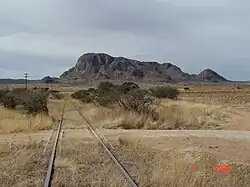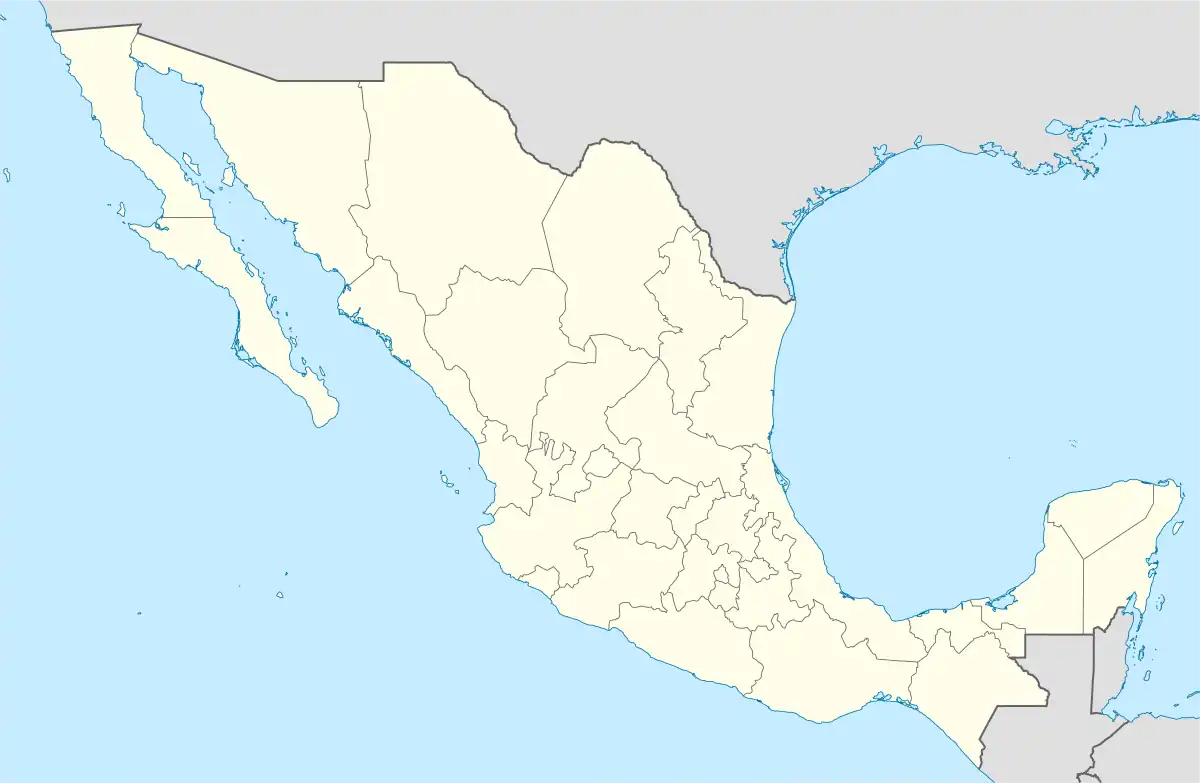Saín Alto Municipality
Saín Alto is a municipality in the Mexican state of Zacatecas, located approximately 110 kilometres (68 mi) northwest of the state capital of Zacatecas City.
Saín Alto | |
|---|---|
 Cerro de San Nicolas, a hill in the northern part of the municipality of Saín Alto | |
 Coat of arms | |
 Saín Alto Location of Saín Alto in Mexico | |
| Coordinates: 23°34′50″N 103°14′55″W[1] | |
| Country | |
| State | |
| Established | 17 January 1825 |
| Seat | Saín Alto |
| Government | |
| • President | José Luis Salas Cordero |
| Area | |
| • Total | 1,415.0 km2 (546.3 sq mi) |
| Elevation [1] (of seat) | 2,056 m (6,745 ft) |
| Population (2020 Census)[2] | |
| • Total | 21,844 |
| • Density | 15/km2 (40/sq mi) |
| • Seat | 5,295 |
| Time zone | UTC-6 (Central) |
| • Summer (DST) | UTC-5 (Central) |
| Postal codes | 99130–99143[3] |
| Area code | 498 |
Geography
The municipality of Saín Alto is located at an elevation between 1,900 and 3,000 metres (6,200–9,800 ft) on the Mexican Plateau in northwestern Zacatecas. It borders the municipalities of Río Grande to the north, Fresnillo to the south, and Sombrerete to the west.[4] The municipality covers an area of 1,415.0 square kilometres (546.3 sq mi)[2] and comprises 1.9% of the state's area.[4]
As of 2009, the land cover in Saín Alto comprises grassland (51%), forest (23%), and matorral (6%). Another 19% of the land is used for agriculture.[4] The municipality lies in the endorheic basin of the Aguanaval River, which flows south to north through the eastern part of the municipality. A portion of the Sierra Madre Occidental known as the Sierra de Chapultepec runs through the southwestern part of the municipality. The range contains small deposits of mercury and tin, which were exploited between the 1940s and 1970s.[5][6][7]
Climate
Apart from the mountains in the south where the climate is classified as temperate, Saín Alto has a semi-arid climate with dry winters.[4] Average temperatures in the municipality range between 12 and 18 °C (54–64 °F), and average annual precipitation ranges between 400 and 700 millimetres (16–28 in).[4]
| Climate data for Saín Alto weather station at 23°34′48″N 103°15′50″W, 2071 m above sea level (1981–2010 averages, 1951–2010 extremes) | |||||||||||||
|---|---|---|---|---|---|---|---|---|---|---|---|---|---|
| Month | Jan | Feb | Mar | Apr | May | Jun | Jul | Aug | Sep | Oct | Nov | Dec | Year |
| Record high °C (°F) | 34.0 (93.2) |
33.5 (92.3) |
36.0 (96.8) |
39.0 (102.2) |
39.0 (102.2) |
39.0 (102.2) |
38.5 (101.3) |
37.0 (98.6) |
40.0 (104.0) |
40.0 (104.0) |
36.5 (97.7) |
34.0 (93.2) |
40.0 (104.0) |
| Average high °C (°F) | 21.6 (70.9) |
23.1 (73.6) |
25.8 (78.4) |
28.3 (82.9) |
30.3 (86.5) |
29.6 (85.3) |
27.3 (81.1) |
26.7 (80.1) |
25.5 (77.9) |
24.9 (76.8) |
23.8 (74.8) |
22.1 (71.8) |
25.8 (78.4) |
| Daily mean °C (°F) | 11.1 (52.0) |
12.6 (54.7) |
15.0 (59.0) |
17.6 (63.7) |
20.3 (68.5) |
21.1 (70.0) |
20.0 (68.0) |
19.5 (67.1) |
18.5 (65.3) |
16.3 (61.3) |
13.5 (56.3) |
11.5 (52.7) |
16.4 (61.5) |
| Average low °C (°F) | 0.6 (33.1) |
2.0 (35.6) |
4.2 (39.6) |
6.9 (44.4) |
10.2 (50.4) |
12.7 (54.9) |
12.7 (54.9) |
12.4 (54.3) |
11.4 (52.5) |
7.7 (45.9) |
3.2 (37.8) |
0.9 (33.6) |
7.1 (44.8) |
| Record low °C (°F) | −13.0 (8.6) |
−7.5 (18.5) |
−6.0 (21.2) |
−6.5 (20.3) |
2.0 (35.6) |
2.0 (35.6) |
2.0 (35.6) |
0.0 (32.0) |
1.0 (33.8) |
−4.0 (24.8) |
−8.0 (17.6) |
−13.0 (8.6) |
−13.0 (8.6) |
| Average precipitation mm (inches) | 12.7 (0.50) |
9.7 (0.38) |
2.4 (0.09) |
5.1 (0.20) |
20.8 (0.82) |
76.2 (3.00) |
103.9 (4.09) |
110.0 (4.33) |
89.4 (3.52) |
36.1 (1.42) |
11.5 (0.45) |
9.0 (0.35) |
486.8 (19.17) |
| Average rainy days (≥ 1 mm) | 2.0 | 1.3 | 0.6 | 1.0 | 3.4 | 8.3 | 12.3 | 12.3 | 9.9 | 5.4 | 1.7 | 1.5 | 59.7 |
| Source: Servicio Meteorológico Nacional[8][9] | |||||||||||||
History
The name of the municipality derives from Zaín or Çayn,[10] a group of Zacateco people who established the settlement of Saín Alto sometime around 1535–1540.[5] These people were led by a cacique named Saín Alonso. The town's full name was originally "San Sebastián con el renombre de Saín", but it eventually became known as San Sebastián de Saín Alto and later just Saín Alto. The earliest Spanish conquistadors to come into contact with the people of Zaín were Ginés Vázquez de Mercado in 1552 and 1553, and Francisco de Ibarra in September 1554.[5]
The first Zacatecas state constitution of 1825 named Saín Alto as a municipality within the partido of Sombrerete, later the district of Sombrerete. Saín Alto became a free municipality on 19 August 1916.[5][11] Mercury mining began in the municipality in 1934, and accounted for 12% of Mexico's mercury production in the years of 1939 and 1940.[5]
Administration
The municipal government of Saín Alto comprises a president, a councillor (Spanish: síndico), and thirteen trustees (regidores), eight elected by relative majority and five by proportional representation.[5] The current president of the municipality is José Luis Salas Cordero.[12]
Demographics
In the 2020 Mexican Census, the municipality of Saín Alto recorded a population of 21,844 inhabitants living in 5504 households.[13] The 2010 Census recorded a population of 21,533 inhabitants in Saín Alto.[2]
INEGI lists 53 localities in the municipality,[13] of which only the municipal seat, also called Saín Alto, is classified as urban. It recorded a population of 5295 inhabitants in the 2020 Census.[13]
Economy and infrastructure
The main crops grown in Saín Alto are corn and beans. Livestock ranching is another important agricultural activity, cattle, goats and horses being the commercially most important animals.[6]
Federal Highway 45 runs through the municipality, connecting it to Sombrerete and Durango City in the west, and Fresnillo and Zacatecas City in the southeast.[6] Federal Highway 49 defines the eastern border of the municipality.
References
- "Sistema Nacional de Información Municipal" (in Spanish). SEGOB. 2010. Retrieved 11 June 2021.
- "México en Cifras" (in Spanish). INEGI. Retrieved 11 June 2021.
- "Consulta de Códigos Postales". Catálogo Nacional de Códigos Postales. Mexican Postal Service. 10 June 2021. Retrieved 11 June 2021.
- "Saín Alto, Zacatecas" (PDF). Prontuario de información geográfica municipal de los Estados Unidos Mexicanos (in Spanish). INEGI. 2009. Retrieved 11 June 2021.
- "Saín Alto". Enciclopedia de los Municipios y Delegaciones de México (in Spanish). INAFED. Retrieved 11 June 2021.
- Inventario físico de recursos minerales de la carta Mesillas F13-B35 (PDF) (Report) (in Spanish). Mexican Geological Survey. December 2012. pp. 10, 24. Retrieved 11 June 2021.
- Foshag, William F.; Fries Jr., Carl (1942). Tin deposits of the Republic of Mexico (PDF) (Report). Geologic Investigations in the American Republics (in Spanish). USGS. pp. 162–163. Retrieved 22 January 2021.
- "NORMALES CLIMATOLÓGICAS" (in Spanish). Servicio Meteorológico Nacional. Retrieved 11 June 2021.
- "NORMALES CLIMATOLÓGICAS" (in Spanish). Servicio Meteorológico Nacional. Retrieved 11 June 2021.
- Carrillo Cázares, Alberto (2000). El debate sobre la guerra chichimeca, 1531-1585. Vol. 2. Zamora: El Colegio de Michoacán, El Colegio de San Luis. p. 565. ISBN 970-679-031-4. Retrieved 21 June 2021.
- Estado de Zacatecas. División Territorial de 1810 a 1995 (PDF) (in Spanish). Mexico: INEGI. 1996. ISBN 970-13-1519-7.
- Alvarado, Silvia (8 June 2021). "Va por Zacatecas gana más municipios". Pórtico (in Spanish). Retrieved 11 June 2021.
- Panorama sociodemográfico de Zacatecas. Censo de Población y Vivienda 2020 (PDF) (in Spanish). INEGI. 2016. p. 94–95. Retrieved 22 January 2021.
